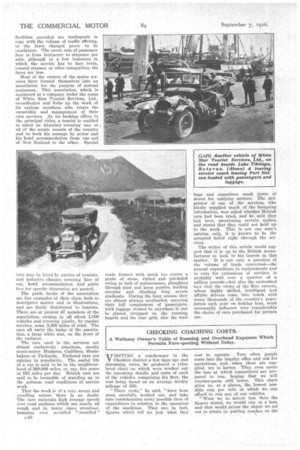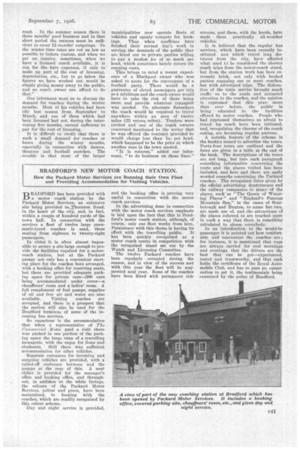CHECKING COACHING COSTS.
Page 62

Page 63

If you've noticed an error in this article please click here to report it so we can fix it.
A Wallasey Owner's Table of Running and Overhead Expenses Which Permits Fare-quoting Without Delay.
V'SITING a coachowner in the Cheshire district a few days ago and discussing rates, he produced a tabulated chart on which were worked out the operating details and costs of each of the vehicles comprising his fleet, the Cost being tamed on an average weekly mileage of 500.
"These costs," he said, "have been most carefully worked out, and take into consideration every possible item of expenditure in relation to the operation of the machines. They are, in fact, figures which tell me just what they
cost to operate. Very often people come into the inquiry office and ask for quotations, and, when these are supplied, try to barter. They even quote the rate at which competitors are prepared to run, hoping that we will counter-quote still lower. This chart gives us, at a glance, the lowest possible cost per mile at which we can afford to run any of our vehicles.
"Were we to accept less than the figures stated, we would run at a loss, and that would de:eat the object we set out to attain in putting coaches on the
road) In the summer season there is three months' good business and in that short period the returns must be sufficient to cover 12 months' outgoings. In the winter time rates are cut as low as Possible to induce custom, and when we get an inquiry, sometimes, when we have a licensed coach available, it is run for the bare expenses, if only to make up part of the cost of licensing, depreciation, etc., but to go below the figures we have worked out, would be simply giving money away to,the public, and no coach owner can afford to do that."
Our informant went on to discuss the demand for coaches during the winter months. Most of his vehicles had been idle last season from September to March, and one of them which had been licensed had not, during the intervening five months, earned sufficient to pay for the cost of licensing.
It is ' difficult to credit that there is such a small demand for coaches or buses during the winter months, especially in connection with dances, theatres and football matches. The trouble is that most of the larger municipalities now operate fleets of vehicles and openly compete for bookings. Thus when machines have finished their normal day's work in serving the demands of. the public they are hired out to private parties willing to pay a modest fee of so much per head, which sometimes barely covers the running costs. •
This brings to mind a recent experience of a Blackpool owner who was asked to quote for the conveyance of a football party. There would be a guarantee of eleven, passengers per trip as a minimum and the coach owner would have to take the risk of there being more and provide whatever transport was needed. On alternate Saturdays the coach would be required to travel anywhere within an area of twelve miles (22 return miles). Tenders were invited and one of the coach owners concerned mentioned to the writer that he was offered the contract provided be would charge less than is. per head. which happened to be the price at which another man in the town quoted.
"it is ruinous," added our informant, "to do business on those lines."












































































































